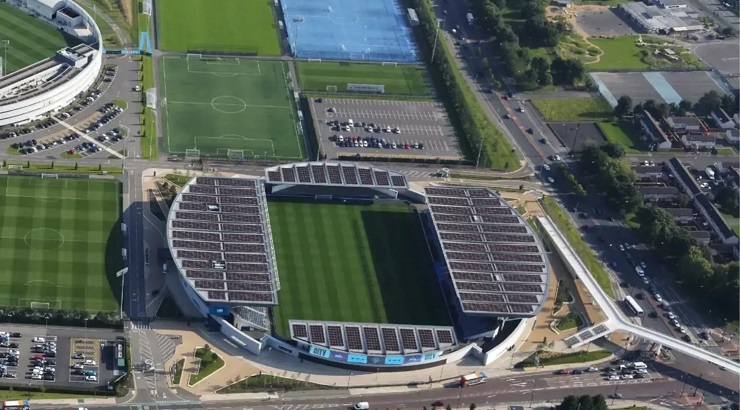Commercial Projects
Man City FC Seeks Nod for 11,000 Solar Panels
The solar panels are expected to generate up to 4.39 MWh annually.

Manchester City FC plans to install 10,887 solar panels on its estates, in a project that will make it one of the top producers of renewable energy in world football.
The Premier League Champions are seeking approval from the Manchester City Council for the installation of the devices, which will generate up to 4.39 MWh a year.
More than 3,000 panels will be installed on the roof of the 7,000-capacity Joie Stadium, home to Manchester City Women, while an additional 3,942 panels will be mounted on the roofs of other facilities on site, such as the First Team and the Academy Building.
A further 3,830 solar panels will be installed on frames over footpaths and pitch-side areas of the City Football Academy.
If approved, the solar park, which is part of Man City FC’s plan to become carbon-zero by 2030, will be fully operational by the end of 2024.
Clearvolt, a Manchester-based renewable energy developer, has been contracted to install the solar panels and manage the solar park upon its completion.
Man City FC’s director of sustainability, Pete Bradshaw, said the solar park will “completely offset the power required to run the day-to-day operations of the City Football Academy”.
RELATED: Why Rivian’s Georgia EV Factory Was Put on Hold
The project, said Bradshaw, will help Man City FC become “one of football’s largest producers of self-supplied, renewable energy”.
“As we look ahead on our roadmap to being net carbon zero by 2030, we know that the production and consumption of renewable energy have an incredibly important role to play, which is why we are delighted at [project],” he added.
City Football Academy
Built 10 years ago on a former industrial wasteland, the City Football Academy has achieved the Gold Standard under Leadership in Energy and Environmental Design guidelines (L.E.E.D.), the world’s most popular green building rating system.
With the latest project, Man City is following in the footsteps of Galatasaray, Ajax, and Plymouth Argyle in producing their renewable energy.
However, the number of solar panels and the installed capacity means the City’s solar park would be larger than that at Galatasaray Stadium in Istanbul, Turkey.
RELATED: Skanska Begins Massive Upgrade of MetLife Stadium
In March 2022, Galatasaray made it to the Guinness Book of World Records with its 10,404 rooftop solar panels that generate 4.3 megawatts (MW) of power.
Four years earlier, the stadium of Dutch soccer giants AFC Ajax had become the site of the largest commercial energy storage system in Europe, following the introduction of a scheme to store electric vehicle batteries at the venue.
Organisations across the globe are increasingly turning to solar energy as a key strategy to achieve their zero-carbon goals.
Solar power presents many significant benefits, such as the reduction of carbon emissions, and provision of a reliable and clean energy source, among others.
By investing in solar, organisations effectively reduce their carbon footprint, secure long-term savings, and establish themselves as exemplars of stability.














